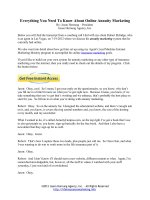pond - safe money in tough times; everything you need to know to survive the financial crisis (2009)
Bạn đang xem bản rút gọn của tài liệu. Xem và tải ngay bản đầy đủ của tài liệu tại đây (1.68 MB, 241 trang )
SAFE MONEY
in
TOUGH TIMES
E
VERYTHING
Y
OU
N
EED
TO
K
NOW TO
S
URVIVE
THE
F
INANCIAL
C
RISIS
JONATHAN D. POND
New York Chicago San Francisco
Lisbon London Madrid Mexico City Milan
New Delhi San Juan Seoul Singapore
Sydney Toronto
Copyright © 2009 by Jonathan D. Pond. All rights reserved. Except as permitted under the United
States Copyright Act of 1976, no part of this publication may be reproduced or distributed in any
form or by any means, or stored in a database or retrieval system, without the prior written
permission of the publisher.
ISBN: 978-0-07-171359-7
MHID: 0-07-171359-X
The material in this eBook also appears in the print version of this title: ISBN: 978-0-07-162961-4,
MHID: 0-07-162961-0.
All trademarks are trademarks of their respective owners. Rather than put a trademark symbol after
every occurrence of a trademarked name, we use names in an editorial fashion only, and to the
benefit of the trademark owner, with no intention of infringement of the trademark. Where such
designations appear in this book, they have been printed with initial caps.
McGraw-Hill eBooks are available at special quantity discounts to use as premiums and sales
promotions, or for use in corporate training programs. To contact a representative please e-mail us
at
This publication is designed to provide accurate and authoritative information in regard to the
subject matter covered. It is sold with the understanding that neither the author nor the publisher is
engaged in rendering legal, accounting, or other professional service. If legal advice or other expert
assistance is required, the services of a competent professional person should be sought.
—From a Declaration of Principles jointly adopted by a Committee of the American Bar
Association and a Committee of Publisher
TERMS OF USE
This is a copyrighted work and The McGraw-Hill Companies, Inc. (“McGraw-Hill”) and its
licensors reserve all rights in and to the work. Use of this work is subject to these terms. Except as
permitted under the Copyright Act of 1976 and the right to store and retrieve one copy of the work,
you may not decompile, disassemble, reverse engineer, reproduce, modify, create derivative works
based upon, transmit, distribute, disseminate, sell, publish or sublicense the work or any part of it
without McGraw-Hill’s prior consent. You may use the work for your own noncommercial and
personal use; any other use of the work is strictly prohibited. Your right to use the work may be
terminated if you fail to comply with these terms.
THE WORK IS PROVIDED “AS IS.” McGRAW-HILL AND ITS LICENSORS MAKE NO
GUARANTEES OR WARRANTIES AS TO THE ACCURACY, ADEQUACY OR COMPLETE-
NESS OF OR RESULTS TO BE OBTAINED FROM USING THE WORK, INCLUDING ANY
INFORMATION THAT CAN BE ACCESSED THROUGH THE WORK VIA HYPERLINK OR
OTHERWISE, AND EXPRESSLY DISCLAIM ANY WARRANTY, EXPRESS OR IMPLIED,
INCLUDING BUT NOT LIMITED TO IMPLIED WARRANTIES OF MERCHANTABILITY
OR FITNESS FOR A PARTICULAR PURPOSE. McGraw-Hill and its licensors do not warrant or
guarantee that the functions contained in the work will meet your requirements or that its
operation will be uninterrupted or error free. Neither McGraw-Hill nor its licensors shall be liable
to you or anyone else for any inaccuracy, error or omission, regardless of cause, in the work or for
any damages resulting therefrom. McGraw-Hill has no responsibility for the content of any
information accessed through the work. Under no circumstances shall McGraw-Hill and/or its
licensors be liable for any indirect, incidental, special, punitive, consequential or similar damages
that result from the use of or inability to use the work, even if any of them has been advised of the
possibility of such damages. This limitation of liability shall apply to any claim or cause
whatsoever whether such claim or cause arises in contract, tort or otherwise.
C
ONTENTS
Preface vii
Acknowledgments ix
P
ART
I
Understanding the Economic Crisis
1. What’s Going On in the Economy? 1
2. This Time It’s Different, but We’re
Not Headed for a Depression 7
3. Checklist of Things to Do Now to
Get Your Financial Act Together 12
P
ART
II
Coping with Tough Economic Times
4. TwelveWinning Strategies to Cope
with Tough Times 17
5. Budgeting for Tough Economic Times 24
6. What to Do when Your Expenses Are
Increasing Faster than Your Income 29
7. Getting Your Debts under Control 38
• iii •
8. Forewarned Is Forearmed—Preparing
for the Unexpected 43
P
ART
III
Investing in Tough Economic Times
9. Investment Strategies for Frightened Investors 57
10. Ten Rules for Investing Successfully
in Turbulent Markets 67
11. Making the Right Stock Investments 80
12. Making the Right Bond Investments 86
13. Making the Right Real Estate Investments 94
14. Keeping Safe Money Safe 100
P
ART
IV
Tackling Special Situations
15. If You Lose Your Job 107
16. If You Think You Might Lose Your Job 114
17. Evaluating Early-Retirement Incentive Plans 120
18. Finding a Job in Tough Times 128
19. Coping with Debt Problems 133
20. Advice for Homeowners 137
21. Advice for Home Sellers 146
22. Opportunities for Home Buyers 151
23. Getting the Kids through College 157
iv • Contents
24. Tips for Worried Preretirees 163
25. Tips for Worried Retirees 171
26. Survival Tactics for Small Business Owners 181
27. The Psychological Side of Money Problems 189
28. Bankruptcy—The Last Resort 192
29. If Inflation Heats Up 195
P
ART
V
Planning for a Secure Financial Future
30. “Been Down So Long”—Getting
Back on Your Feet 199
31. How the New Administration May Affect
Your Pocketbook 203
32. Profiting from Prosperity 209
Appendix: Web Sites to Help You in Tough Times 215
Index 225
Contents • v
This page intentionally left blank
P
REFACE
I
n spite of how helpless you feel riding the economic roller
coaster, you can overcome the fear and confusion of the Great
Recession. There’s no more critical time than now to stop let-
ting your money control you so that you can control your money.
Safe Money in Tough Times will help you make sense out of the
often conflicting and always confusing opinions of “experts”
about what you should be doing with your investments and other
per sonal financial matters during these challenging times.
Unlike other authors and commentators, I will not tell you to
put all your money into gold or canned goods or to hide your
money in a mattress. I’m also not predicting a depression, but I
think we are going to have to endure a formidable and lengthy
recession with a slow recovery, clearly the worst worldwide eco-
nomic crisis since the Great Depression.
If you’re looking for something bizarre to do with your money,
you’ve come to the wrong book. What I will show you is how to
invest wisely and well amidst downright scary investment mar-
kets, using investments that you already understand. But there
is a lot more involved in surviving the Great Recession than
investing. I will help you if and when you become a victim of
the slow economy—if you lose your job or fear that you may lose
your job, if you get into debt problems, or if you’re having trou-
ble affording college tuition for your children. An entire section
of the book, “Tackling Special Situations,” ad dresses the prob-
• vii •
lems that will befall many people over the next couple of years.
The Internet can be a useful resource for guidance and infor-
mation to help you improve your financial status. The Appen-
dix contains a list of helpful financial Web sites.
Tough financial times need not be a totally negative experi-
ence, however. Because our financial lives are unsettled during
an uncertain economy, we are forced to take a closer look at the
way we manage and spend our money. This will not be a bad
time to begin to discard some bad financial habits and replace
them with better habits. As hard as it may be to believe in light
of the stock market and economic meltdowns, there are many
opportunities to grow financially during an awful economy, and
these opportunities will be discussed in the chap ters that follow.
I hope you will find a lot of useful information in this book so
that you can approach the challenges ahead with more confi-
dence and, in the process, be able to sleep a little bit better, know-
ing that you are back on the road to achieving financial security.
S
PECIAL
R
EADER
W
EB
S
ITE
The economy and investment markets will undoubtedly change
frequently as we struggle with the worldwide economic crisis and
emerge from the doldrums. The special reader Web site will
keep you up to date on changing conditions and provide further
guidance on keeping your money safe in tough times. Check it
out from time to time: www.jonathanpond.com/safemoney.html.
viii • Preface
A
CKNOWLEDGMENTS
T
his book has benefited immensely from the assistance of sev-
eral very capable people. The encouragement and helpful
comments of Jeanne Glasser, my editor at McGraw-Hill, are
much appreciated. Ruth Mannino handled the production
process with great skill. The assistance of my associates, John
Annino, Joan Lohr, and Richard Merrill, is gratefully acknowl-
edged. Financial authors Alan Lavine and Gail Liberman
offered many useful suggestions, as did my agent, Peter Gins-
berg. I sincerely appreciate the efforts of all of you.
By now my wife, Lois, and our three daughters, Elizabeth,
Laura, and Emily, are accustomed to the inevitable long
absences that are endemic to book authoring. But it is no less
stressful, and I thank them once again for their forbearance.
• ix •
This page intentionally left blank
Part I
Understanding the
Economic Crisis
1W
HAT
’
S
G
OING
O
N
IN THE
E
CONOMY
?
What’s going to happen to me?
T
here’s no doubt about it: these are tough times for Ameri-
cans—indeed, for families throughout the world. Safe
Money in Tough Times will help you and your family deal with
the challenges. Whatever problems the bad economy dishes out
to you, you will find help in these pages. How bad are things? In
just one day in late 2008, the following events were in the news:
•
Stocks drop another 4 percent; they’re down almost 40
percent so far this year.
•
Seventeen major retail chains may be in jeopardy.
•
Small business owner optimism index is at a multidecade
low.
•
Bailout plans strain as a growing number of companies
need assistance.
•
Circuit City files for bankruptcy.
• 1 •
•
U.S. auto manufacturers are on the brink of bankruptcy;
General Motors stock is at a 66-year low, with some
analysts predicting that the stock price will go to zero.
•
Orbitz lays off 10 percent of its workforce.
•
American Express gets access to bailout money, as a rising
number of cardholders are having trouble making
payments.
•
Economists predict that the recession will be one of the
longest in history.
•
Starbucks’ profit tumbles 97 percent.
•
Leading home builder reports that customer traffic and
sales hit record lows.
•
AIG reports a huge loss; rescue package is raised to $150
billion.
•
Worldwide economic crisis worsens; China announces
$586 billion stimulus package.
•
A survey of large businesses reveals that none planned to
hire over the next three months.
•
DHL announces 9,500 jobs to be cut.
•
280,000 homes entered foreclosure in the previous month.
What’s going on with the economy? And more importantly,
what does it mean to you? How will you and your family be
affected? What should you do now to protect yourself from the
tough times ahead? Some people have been severely affected by
the worldwide economic crisis. What if you’re one of them? This
book will help you understand what’s going on and, more impor-
tantly, will show you what you can do to survive the economic
doldrums, no matter how badly you are affected. What’s more,
Safe Money in Tough Times will show you ways to take control
over and manage your finances in such a way that you’ll emerge
2 • Safe Money in Tough Times
from the Great Recession well positioned to prosper during bet-
ter economic times.
H
OW
W
E
G
OT INTO
T
HIS
M
ESS
There is a lot of blame to go around for the global financial melt-
down. A conglomeration of factors converged to make a perfect
storm. The complex problems hit a crescendo when banks found
themselves unable to make loans.
Many people blame lax financial regulation and consumers
who, along with the U.S. government, borrowed like there was no
tomorrow. Then there were the lenders who carelessly made loans
to borrowers with poor credit. Of course, investors who failed to
research their investments and Wall Street firms that engaged in
excessive risk taking share the guilt. Add in securities rating agen-
cies that overrated risky securities and credit-scoring companies
that allowed human beings to be removed from much of the lend-
ing decision-making process. It was a recipe for disaster.
Thirty Years in the Making
The seeds of the financial meltdown may have been planted as far
back as the 1970s under the Carter administration. The economy
was stagnating, and taxes were high. Many people believed that
deregulation of the financial industry would result in more private
investment in stocks and bonds and spur economic growth. It also
would allow U.S. financial institutions to better compete globally.
At the same time, government policies focused on homeowner-
ship and small business, which many considered the keys to build-
ing economic prosperity. The Community Reinvestment Act of
1977 required commercial banks and savings institutions to make
What’s Going On in the Economy? • 3
loans in low- and moderate-income neighborhoods. Subsequent
administrations, both Democratic and Republican, built on these
programs, which eventually led to the unraveling of the economy.
The Federal Housing Enterprises Financial Safety and
Soundness Act of 1992 required two secondary mortgage mar-
ket players to support affordable housing. The government-
sponsored players were the Federal National Mortgage Associa-
tion, or “Fannie Mae,” and the Federal Home Loan Mortgage
Corp., or “Freddie Mac.” This action led to the proliferation of
riskier no- and low-down-payment mortgages.
Subsequently, the Clinton administration encouraged home
loans in the nation’s inner cities and rural areas. The Financial
Services Modernization Act of 1999 repealed the Glass-Steagall
Act of 1933, which prevented banks from engaging in invest-
ment banking and vice versa. As a result, banks began getting
into the securities business in a big way—and vice versa.
The bursting of the technology and dot.com bubble at the turn
of the century was followed by an extended period of low interest
rates and skyrocketing home prices. An industry of third-party mort-
gage brokers blossomed, with limited regulation or accountability.
The combination of these political initiatives fueled wide-
spread aggressive lending and relaxed standards for home loans,
and encouraged speculation. Competition among several types
of lenders led to loans with increasingly low monthly payments
and no income documentation. Unfortunately, these lower-
payment “option” loans were often riskier and more costly than
traditional 30-year fixed-rate mortgage. Yet, those loans increas-
ingly were made at higher interest rates to lower-income bor-
rowers. Many people who ordinarily would not qualify for a
mortgage were issued home loans.
4 • Safe Money in Tough Times
A Double Whammy
The straw that broke the camel’s back came in 2007, when
interest rates rose and home prices fell. The U.S. government
put Fannie Mae and Freddie Mac into conservatorship in the
last half of 2008 because they were nearing bankruptcy. Mak-
ing matters worse, mortgages had been packaged by Fannie
Mae and Freddie Mac and sold to investors. Borrowers often did
not know who actually owned their loans. In addition, quasi-
insurance contracts transferring the risk of the mortgages to oth-
ers had also been sold, with little regulation or oversight. Today,
the big question has become how to value those “credit default
swaps” and other so-called credit derivatives created from mort-
gage pools. The disaster started in the United States but quickly
spread overseas.
The government will move to stimulate the economy under
the Obama administration. Rebate checks or tax cuts will be
given to lower- and middle-income Americans in an attempt to
prop up the sagging economy. Massive job creation programs
will also be undertaken. Efforts by leading banks and the U.S.
government will help stem foreclosures.
This debacle will eventually begin to subside. But even then,
individuals and families will probably spend years getting out
from under the adverse effects of the Great Recession.
A G
UIDE FOR
S
URVIVING THE
G
REAT
R
ECESSION
Now that you have some understanding of how we got into this
mess, it’s time to begin to consider what actions you need to take,
both to survive the downturn and to emerge from it in sound
financial condition so that you can take advantage of the pros-
What’s Going On in the Economy? • 5
perity that always fol lows recessions. After showing you why we’re
not headed for a depression, despite some irresponsible talk
about it in the media, Chapter 3 provides some information on
things you can do right away to minimize the effect of the reces-
sion on your finances. The remainder of the book is divided into
four sections: “Coping with Tough Economic Times,” “Invest-
ing in Tough Economic Times,” “Tackling Special Situations,”
and “Planning for a Secure Financial Future.” Since the Inter-
net can be a wonderful resource for guidance and software to
help you deal with your financial challenges, I have listed my
favorite financial Web sites in the Appendix.
Parts II and III will guide you through a variety of concerns
as you try to grapple with your personal finances, including sav-
ing, managing your debt, budgeting, reducing expenses, main-
taining your insurance, and, of course, investing wisely and well
after the terrible drubbing that investors have suffered.
Part IV deals with special situations that may be of concern. In
fact, it is quite likely that a few of these special situations will apply
to you and your family. They include coping with unemployment,
working through credit problems, challenges for homeowners, and
helping your family survive the psychological problems that often
accompany distressed fam ily finances. This section also includes
tips for worried preretirees and retirees, paying for college in tough
times, and survival strategies for small business owners.
The last section of the book will provide some advice to help
you recover from the effects of the economic tsunami so that you
can prosper in the next economic boom. It also takes a look at
how the new administration may affect your pocketbook.
Finally, my special Safe Money in Tough Times reader Web site
will keep you up to date on matters affecting the economy and
6 • Safe Money in Tough Times
your financial well-being. The address is www.jonathanpond.com/
safemoney.html.
When all is said and done, financial security is what personal
financial planning is all about. Unfortu nately, we are going
through a period of time that may interrupt a lot of people’s
progress toward achieving their financial aspirations. I hope that
after reading the pages that follow and taking appropriate action,
you will be able to look back at this time as an annoying, but not
overwhelming, disruption in your per sonal financial progress,
one that helped you prepare for an even better financial future.
2T
HIS
T
IME
I
T
’
S
D
IFFERENT
,
BUT
W
E
’
RE
N
OT
H
EADED
FOR A
D
EPRESSION
T
he scary word depression has been popping up on the air-
waves, but don’t let it rattle you. A depression is a severe
decline in economic activity that lasts for years. Economists
already acknowledge that we are in the midst of a recession,
which is a temporary but significant decline in economic activ-
ity. In fact, many have called this country’s economic state the
worst recession since the Great Depression of the 1930s.
T
HE
G
REAT
R
ECESSION
Although the recession is likely to turn out to be severe, econo-
mists have stopped short of calling it a depression, even though
This Time It’s Different • 7
that may be how you feel when you open up your monthly
investment statements. Why? The U.S. government takes a
much more active role in the economy than it did during the
Great Depression of the 1930s.
Today we have safety nets, like federal deposit insurance,
social security, unemployment benefits, and welfare pro-
grams. If the situation gets particularly dire, the government
can step in and lower interest rates, or even take over insti-
tutions or companies. We’ve already been watching this hap-
pen in the government bailouts of Fannie Mae, Freddie
Mac, AIG, and Citigroup, with more names to be added to
the list.
You might think that residential real estate is one sector of the
economy that is experiencing problems similar to those in the
Great Depression. New housing starts have dropped 64 percent
since their peak in 2006. That sounds like a lot. It’s certainly sim-
ilar to the decline during the 1974 recession. But in the 1930s,
housing starts dropped a whopping 90 percent.
As in the Great Depression, unemployment is rising. It could
hit 8 percent or more, based on estimates. But that, too, is a far
cry from the 1930s, when about one of every three persons was
out of work.
Fortunately, we are benefiting from low inflation, running at
around 2
1
⁄2 percent. That’s mild even when compared with the
double-digit inflation rates of the 1970s. During the early part of
the 1930s, there was a 20 percent annual deflation rate. That
means that prices dropped 20 percent annually because no one
had any money to spend or save.
Economists acknowledge that we could see economic growth
decline further. But they expect nothing like the gross domestic
8 • Safe Money in Tough Times
product decline of 26 percent that occurred during the period
from 1926 to 1932.
L
ESSONS
L
EARNED
Even if things do get worse, we have already learned many hard
lessons, and we are better prepared to deal with crises in the econ-
omy and the investment markets. In the wake of the 1929 stock
market crash, the Federal Reserve was too slow to lower interest
rates and stimulate the economy, and there was no federal deposit
insurance. Thousands of bank failures resulted. This time
around, the Federal Reserve and the U.S. Treasury have already
acted to keep the financial crisis from spreading. They’re on the
lookout for ways to pump money into the economy and help
companies and homeowners. In fact, we even saw global unity,
with several countries taking economic action simultaneously.
There’s no denying that we’re in a mess. For years, both
businesses and consumers borrowed from Peter to pay Paul.
Banks made low-rate adjustable-rate mortgages to persons who
could not afford the homes they bought. Meanwhile, banks
packaged these loans into securities and sold them to institu-
tional investors. The institutional investors purchased credit
default swaps to protect themselves against losses from mort-
gage defaults.
The end result: homes went into foreclosure, and banks and
investors in mortgage-backed securities and credit default swaps
lost their shirts. The real estate bubble burst, interest rates rose,
and housing values plummeted. It became impossible to place
a value on certain investments, and insurance companies were
unable to cover losses.
This Time It’s Different • 9
Unlike what happened in the Great Depression, however, our
government came up with an initial $700 billion to bail out our
financial system. Lenders started modifying mortgages to avert
foreclosures. Some beleaguered homeowners were able to make
lower, more affordable monthly payments. In addition to finan-
cial institutions, other struggling companies lined up for gov-
ernment largesse.
Other major differences between now and the Great Depres-
sion: some corporations, such as Microsoft, are maintaining low
debt levels and still have tons of cash on the books. And on the
employment side, there are still a lot of people earning money
and, hopefully, saving it.
No one knows for sure exactly how much it will take to get
us out of this mess. Does all this mean that Uncle Sam is buy-
ing consumers and businesses a free lunch? Heck, no! Uncle
Sam is borrowing more money. Our country’s budget deficit
will be in the trillions of dollars. Future generations, unfortu-
nately, will pay for our mistakes. I can only hope that every-
one—individuals, families, businesses, and governments—will
learn a lasting lesson.
Is Deflation on the Horizon?
Falling prices for consumer goods are one of the few welcome
by-products of the steep decline in economic activity. Fuel,
transportation, clothing, and housing costs declined in late
2008, and if the price declines continue, there is at least some
risk that the economy will go through a period of deflation.
But before you jump for joy at the specter of everything
becoming cheaper, deflation can have a very serious impact
10 • Safe Money in Tough Times
on an economy. Borrowers, banks, and businesses would all
be hurt by deflation, as happened during the Great Depression
of the 1930s. As prices fall, consumers and businesses become
less willing to spend and invest. After all, why buy something
now if it will be cheaper next year? Businesses would be com-
pelled to reduce prices further to attract buyers, thrusting the
economy into a downward spiral. Sustained deflation will
shrink the economy, and unemployment will rise.
Any family or business or government that is in debt can
be hammered by deflation as well. Borrowers benefit from
inflation because they pay off their loans with “cheaper dol-
lars,” money that has less purchasing power. But under defla-
tion, the purchasing power of money actually increases, which
means that borrowers are paying back their loans with money
that has increased in real value. It’s the equivalent of having
to pay back a $1,000 loan with $1,100 plus interest.
While deflation is still very unlikely, if trends suggest that
it is a possibility, here are some defensive measures you can
take:
• Put more money into short-term bond funds and money
market funds.
• Buy dividend-paying stocks of companies that will be able
to cope with deflation.
• Pay off as much debt as you can.
• Put off any large purchases.
• Enhance your job skills so that you can stay employed in
the event that unemployment skyrockets.
This Time It’s Different • 11
3C
HECKLIST OF
T
HINGS TO
D
O
N
OW TO
G
ET
Y
OUR
F
INANCIAL
A
CT
T
OGETHER
I remember past recessions. We had a real tough time—
we almost lost the house. We’re in better financial shape
now, but I still worry about what’s going to happen, since
the economy is going to take a long time to get back on
track. I want to be prepared this time.
T
ough economic times affect us all; unfortunately, some peo-
ple suffer more than others. Don’t wait for recession prob-
lems to affect your personal fi nances any more than they already
have. You can do a number of things today to prepare for the
troubles that may lie ahead. The rest of this book will describe
these important matters in more depth and help you address
problems that may be affecting you now or in the near future,
such as investing when most people are scared of the stock mar-
ket, family money problems, and unemploy ment. The follow-
ing checklists can help you begin to organize your financial life
so that you will not be taken by surprise if and when a financial
problem arises during this long and severe recession. It’s never
too late to prepare.
B
UDGETING AND
R
ECORD
K
EEPING
•
Prepare a household budget that lists past and expected
future income and expenses. Through this budget, you
can identify spending patterns and adjust them, if
12 • Safe Money in Tough Times
necessary, to reflect changes in your financial situation or
outlook. If you’re not into budgeting, accomplish the
same objective of improving your financial position by
increasing your savings through automatic transfer from
your paycheck or bank account into an investment or
savings account. (See Chapter 5.)
•
Evaluate your sources of income and how you spend your
money so that you can plan ways to reduce expenses or
earn extra income should the need arise. (See Chapter 6.)
•
Prepare a summary of your assets (home, investments,
and so on) and liabilities (debts) so that you can get an
idea of what you own and what you owe. This summary
will help you identify what resources you have available
to meet future obli gations.
•
Organize your personal records so that you have ready
access to important family documents and personal
financial information. If you need to ad dress a pressing
financial problem, the last thing you’ll want to have to
spend your time on is locating and organizing your
records.
I
NSURANCE
You don’t want to risk an expensive uninsured loss in the midst
of a weak economy. Review your insurance policies to make sure
you have adequate, but not excessive, coverage in the following
areas. (See Chapter 8.)
•
Health insurance
•
Disability insurance
•
Homeowner’s or renter’s insurance
Get Your Financial Act Together • 13
•
Automobile insurance
•
Extended personal liability (umbrella) insurance
•
Professional liability insurance if you have your own
business
•
Life insurance
Long-term care insurance may also come in handy later on if
you or a spouse or partner needs home health care or nursing
home care.
D
EBT
M
ANAGEMENT
•
Summarize your loans and other obligations, in cluding
payment schedules, so that you can plan to meet these
obligations comfortably. (See Chapter 7.)
•
You are entitled to receive a free credit report annually
from each of the three credit bureaus: Equifax,
TransUnion, and Experian. To request your reports, visit
www.annualcreditreport.com or call (877) 322-8228. Don’t
respond to ads for “free” credit reports that end up costing
you money. Review your credit reports for accuracy. If you
find any errors, request that they be corrected.
•
Review your loan status to determine your capacity to
increase your borrowing should you need to.
•
Reevaluate any contemplated major purchases, such as a
home, home improvements, or an auto mobile, in light of
the current economic situation. While the economy may
benefit from these purchases, it may make sense to
postpone them. (You can rely on other members of your
community to boost the economy by buying things they
neither need nor can afford.)
14 • Safe Money in Tough Times









